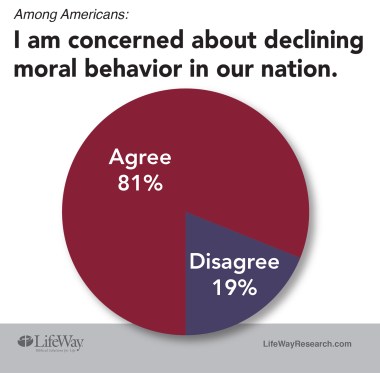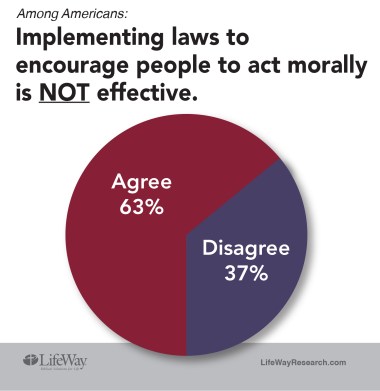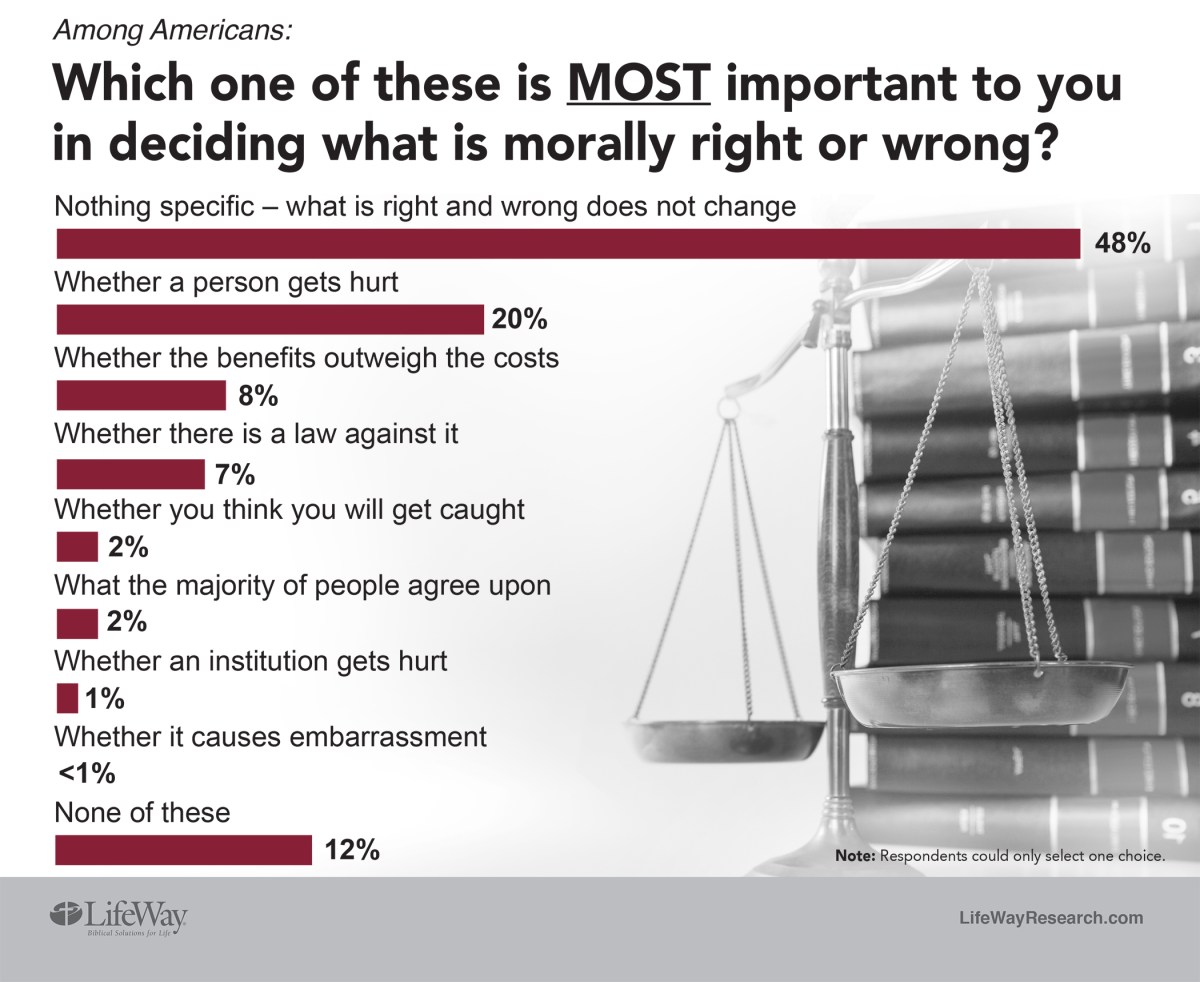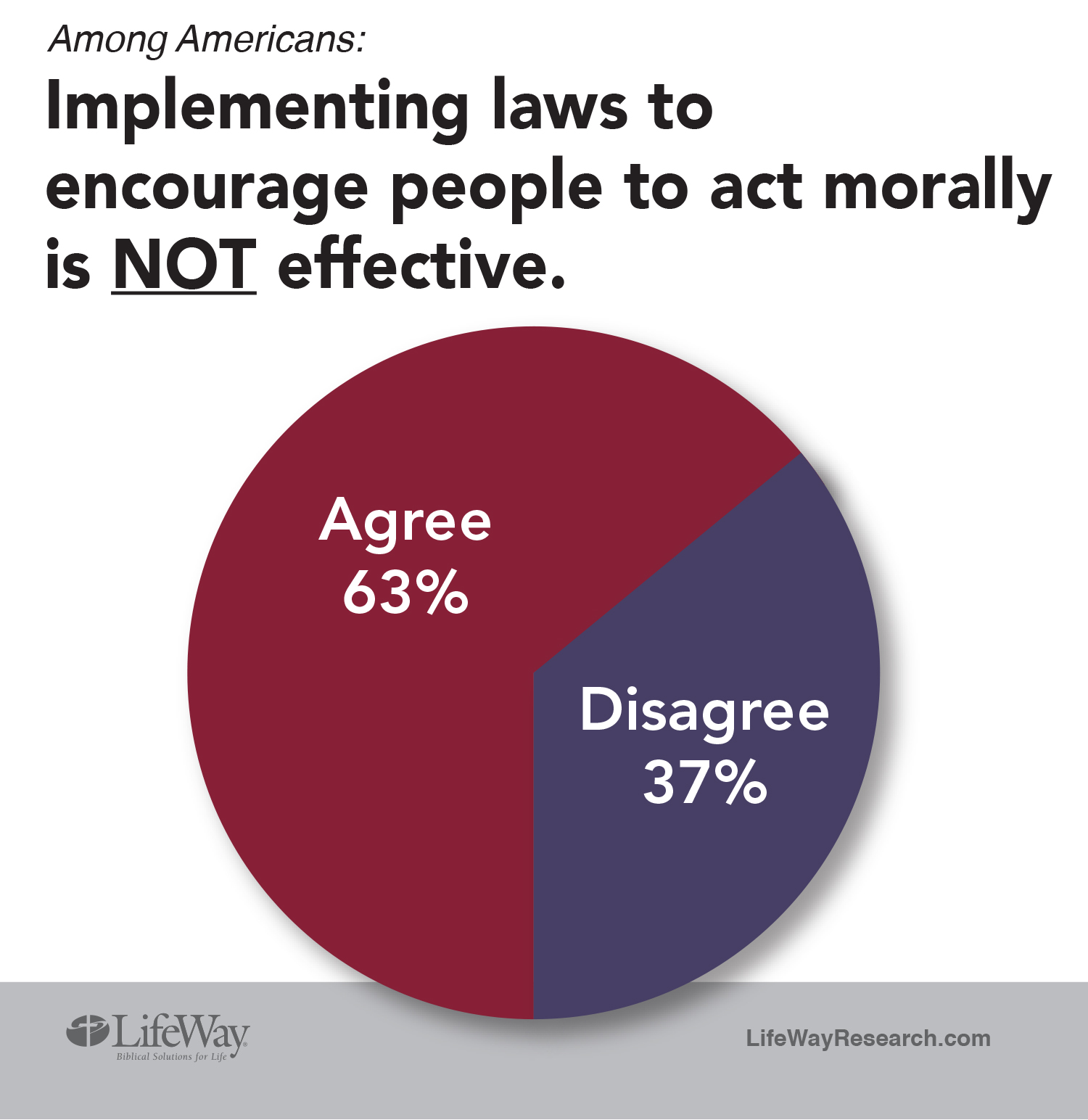When it comes to morality, evangelicals and religious “nones” overwhelmingly agree on one thing: it’s declining.
One factor: Too many laws regulating moral behavior have been removed, according to 7 in 10 Americans with evangelical beliefs. Yet 6 in 10 believe that such laws are not effective at encouraging people to act morally.
A new study from Nashville-based LifeWay Research finds that most Americans worry moral behavior is on the decline.
In a representative survey of 1,000 Americans, researchers found 81 percent of Americans agree with the statement, “I am concerned about declining moral behavior in our nation.” Nineteen percent disagree.

Worry about morals differs across demographic lines, but remains consistently high. Most Americans older than 65 (85%) are concerned about declining moral behavior, as are those 18 to 24 (71%.) Those with graduate degrees (72%) agree, as do those with a high school degree or less (85%).
So do Christians (85%), those of non-Christian faiths (70%) and “nones”—those with no religious affiliation (72%). White Americans (82%), African-Americans (86%), Hispanic Americans (73%) and Americans of other ethnicities (75%) agree as well.
Yet Americans disagree over whether morality can be legislated.

Almost two-thirds (63%) agree with the statement, “Implementing laws to encourage people to act morally is not effective.” Thirty-seven percent disagree. The views of Americans with evangelical beliefs are not statistically different: 59 percent agree, and 41 percent disagree.
On the other hand, fewer than half (44%) agree with the statement, “The fewer laws regulating moral standards, the better.” Fifty-six percent disagree.
Men (49%) are more likely to agree than women (39%). Nones (55%) are more likely to agree than Christians (39%.) Those who attend religious services less than once a month (48%) are more likely to agree than those who attend at least once a month (36%).
Half of Americans (51%) also think too many laws about moral standards have been removed. About half (49%) disagree. Those with evangelical beliefs (72%) are more likely to agree than Americans who don’t hold evangelical beliefs (46%). Christians (55%) are more likely to agree than those of other faiths (36%) or nones (42%).
Diverse factors shape American morals
As part of the study, LifeWay Research also asked Americans how they decide between right and wrong on a personal level.
Half (52%) say right and wrong never change. A third (32%) say whether or not someone gets hurt plays a role in determining if something is right or wrong. Americans also consider whether something is legal (24%) or whether the benefits outweigh the costs (20%) when thinking about morality. Fewer worry about what the majority of people think (8%) or whether an institution gets hurt (10%).
Overall, Americans seem guided more by their internal moral compass than by laws. Almost no one (4%) worries about getting caught when deciding between right and wrong.

Faith, geography, education, and gender divide Americans when it comes to morals.
That’s especially true about the link between morality and preventing harm. Women (36%) are more likely than men (28%) to consider whether someone gets hurt when thinking about right and wrong. Midwesterners (37%) worry more about hurting others than Southerners (27%). So do those with a bachelor’s degree (44%) or a graduate degree (38%), nones (44%) and those without evangelical beliefs (35%).
Those with a high school degree or less (26%), Christians (26%) and those with evangelical beliefs (16%) are less likely to consider whether someone gets hurt when looking at right and wrong.
Moral influences in society
LifeWay Research looked at the factors that shape the shared moral views Americans think society should hold.
Researchers asked the question two ways. First, they gave Americans a list of potential factors and asked them to select as many as applied. Among those influences: parents (64%), religious beliefs (50%), personal feelings (42%), friends (35%), teachers (26%) and media like books, movies and music (14%).
When asked which of those factors are most influential in shaping their moral views, Americans name their parents (39%), followed by their religious beliefs (26%) and their feelings (18%). Friends (4%), teachers (2%) and media (3%) are less influential.
Those with evangelical beliefs are most likely to point to their faith (64%), rather than their parents (22%). Those who attend religious services once or more a month also say faith (51%) has the biggest influence on their morals—as opposed to only 13 percent of those who attend less than once a month.
Scott McConnell, executive director of LifeWay Research, said he’s not surprised that evangelicals point to their faith first when it comes to morality.
“For those with evangelical beliefs, the Bible is the ultimate authority,” he said. “It trumps everything. So it’s going to be the source for how they determine right from wrong.
“However, for Americans there is no most influential source of morality embraced by a majority.”
Researchers also found a significant generation gap in how Americans view morality.
More than 6 in 10 of those older than 45 say right and wrong do not change. For those 35 and younger, fewer than 4 in 10 make that claim.
That’s a huge shift between generations, said McConnell. Older Americans grew up at time when ideas about morality were more stable, he says. That’s no longer true for younger Americans.
“We are shifting very fast from a world where right and wrong didn’t change to a world where right and wrong are relative,” McConnell said. “We are not all on the same page when it comes to morality. And we haven’t reckoned with what that means.”
Bob Smietana is senior writer for Facts & Trends.
Methodology:
LifeWay Research conducted the study Sept. 2 – Oct. 1, 2016, using the web-enabled KnowledgePanel®, a probability-based panel designed to be representative of the U.S. population. Initially, participants are chosen scientifically by a random selection of telephone numbers and residential addresses. People in selected households are then invited by telephone or by mail to participate in the web-enabled KnowledgePanel®. For those who agree to participate but do not already have internet access, GfK provides at no cost a laptop and ISP connection.
Sample stratification and weights were used for gender, age, race/ethnicity, region, metro/non-metro, education and income to reflect the most recent U.S. Census data. The completed sample is 1,000 surveys. The sample provides 95 percent confidence that the sampling error does not exceed plus or minus 3.1 percent. Margins of error are higher in sub-groups.
LifeWay Research is a Nashville-based, evangelical research firm that specializes in surveys about faith in culture and matters that affect churches.












